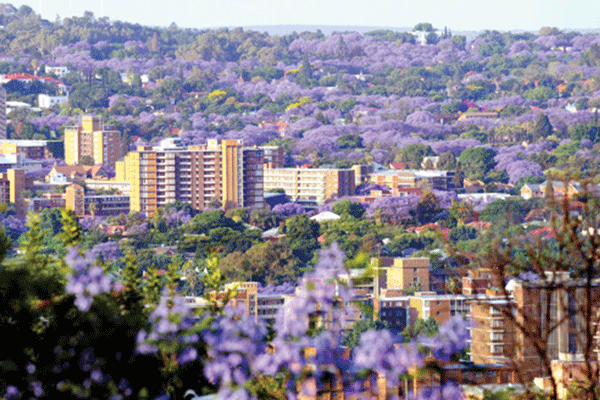
JOHN Dalberg-Acton, First Baron Acton, once said: “History is not a burden on the memory, but an illumination of the soul.”
Guest Column: FUBAR BUNDY

The human race is of African origin. This is an undisputed fact. So, let’s get started by asking the following question: How old is the African race?
According to scientists, the oldest known skeletal remains of anatomically modern humans (or Homo sapiens sapiens) were excavated at sites in East Africa. Human remains were discovered in Ethiopia that were dated at 195 000 years old — the oldest known in the world.
Good. Now we know (approximately) how long people have been running around on their hind legs in this vast continent of ours.
Which raises the next question: Except for Egypt (where they built those silly pyramids and sphinxes), what have African people got to show for their thousands upon thousands of years of “history?”
Virtually nothing! Not a thing! Nada!
Please, don’t even mention the Zimbabwe ruins — this haphazardly packed pile of rocks is not much larger than the kraal on my uncle’s farm in India, where his goats sleep at night.
- Chamisa under fire over US$120K donation
- Mavhunga puts DeMbare into Chibuku quarterfinals
- Pension funds bet on Cabora Bassa oilfields
- Councils defy govt fire tender directive
Keep Reading
Now, a final question: Why have African countries so little record of their histories, except that which the colonialists, who occupied them at various times, cared to record?
Well, for one thing, before the colonialists came, very few Africans were literate — they were unable to put their (his)stories in writing, and, thus, create a reliable record for posterity.
Plus, the fact that, as always in Africa, there were the never-ending wars and plundering, power shifts, devastating droughts, diseases, and refugees fleeing to distant lands. All of these banes to their existence prevented African people from establishing permanent, well-maintained, and lasting buildings and infrastructure in their countries.
However, one would have thought that with the arrival of the modern era, things would change. It has not.
In the Republic of South Africa, ever since the ANC came into power in 1994, the government has been hell-bent on obliterating every single hint of the “colonial” history of this country.
The names of provinces, cities and towns, streets, hospitals, parks, sport stadiums, airports, schools, etc — all had their names changes haphazardly, and seemingly, with malice aforethought.
The most frequent reason given by the incompetent ANC government is that the names reminded people of the “apartheid regime” and the evil white “oppressors”, who originally named these places.
But, what the “name changers” don’t seem to realise, is that, in the renaming process, they have destroyed not only the “colonial” names, but large chunks of their own history as well.
Let’s look at Church Street, Pretoria, in the province previously named, “Transvaal”.
Transvaal means: “Across the Vaal (River).” The province, in which Pretoria now sits, has been renamed Gauteng: “Place of Gold,” even though there is very little gold to be found.
Pretoria has been renamed (at an estimated cost of over R1,5bn): “Tshwane.” No one seems to know where this name comes from.
It could mean “monkeys; black cow; white cow; we are the same; we are not the same; the son of Chief Mushi,” etc. No one knows for sure. The precise origin may well now forever be “lost to history”.
Church Street has been given no fewer than four new names: Stanza Bopape (from Nelson Mandela Drive to the east), Helen Joseph (from Nelson Mandela Drive to Church Square), WF Nkomo (from Church Square to R511), Elias Motswaledi (from R511 to the west). How people could possibly be offended by the name “Church Street,” is beyond anyone’s comprehension.
But, be that as it may, the renaming process is reminiscent of 1 Samuel 15:2-3, where God commanded Saul and the Israelites, “This is what the Lord Almighty says: ‘I will punish the Amalekites for what they did to Israel when they waylaid them as they came up from Egypt. Now go, attack the Amalekites and totally destroy everything that belongs to them. Do not spare them; put to death men and women, children and infants, cattle and sheep, camels and donkeys’.” (And city and street names?)
In other words, wipe out the history of these “colonial” Amalekites. (And the process, your own.) The problem, throughout Africa, is that renaming takes precedence over maintaining. Thus, cities and towns, streets, hospitals, parks, sport stadiums, airports, schools, etc have been renamed but not maintained.
In the end, not only is the history of a country lost forever, but everything that has been renamed, is just a miserable relic of what it once was.
Surely, the money spent on renaming could be spent in more useful ways. Hospitals, schools, upgrade of infrastructure, housing for the homeless, job creation, care for the poor, frail, and elderly. And so much more.
My advice: Africa, make a name for yourself. Don’t destroy your history. Learn from it, and prosper.
Fubar Bundy is a renowned writer, of Indian origin, who travels the world and comments on the state of the various nations in general; and the level of development of selected countries in particular. This article first appeared on Khuluma Africa.











